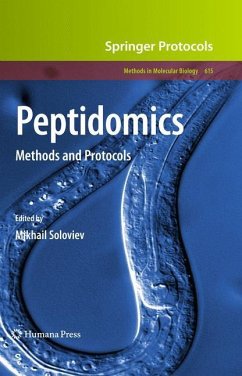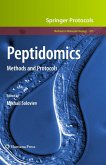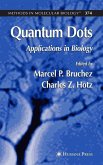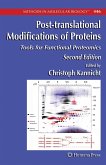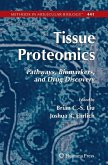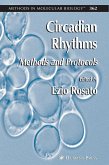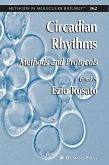Despite being known and studied for years, peptides have never before attracted enough attention to necessitate the invention of the term "peptidomics" in order to specify the study of the complement of peptides from a cell, organelle, tissue or organism. In Peptidomics: Methods and Protocols, expert researchers present a comprehensive range of analytical techniques for the analysis of the peptide contents of complex biological samples with an emphasis often on higher throughput techniques, suitable for the analysis of large numbers of peptides typically present in the peptidomes. Encompassing a number of species ranging from bacteria to man, the methods presented intensively cover topics such as organism handling, tissue and organ dissection, cellular and subcellular fractionation, peptide extraction, fractionation and purification, structural characterization, molecular cloning, and sequence analysis. Written in the highly successful Methods in Molecular Biology(TM) series format, chapters include introductions to their respective topics, lists of the necessary materials and reagents, step-by-step, readily reproducible laboratory protocols, and notes on troubleshooting and avoiding known pitfalls.
Comprehensive and cutting-edge, Peptidomics: Methods and Protocols brings this ten year old field fully up-to-date in order to inspire novices and experts alike with the easy-to-follow practical advice needed to set up and carry out analysis of the peptide contents of complex biological samples.
Comprehensive and cutting-edge, Peptidomics: Methods and Protocols brings this ten year old field fully up-to-date in order to inspire novices and experts alike with the easy-to-follow practical advice needed to set up and carry out analysis of the peptide contents of complex biological samples.
From the reviews:
"Peptidomics-Methods and Protocols focuses on high-throughput techniques for the analysis of peptidomes from a wide range of biological systems ... . The procedures covered in this book encompass a number of model and non-model organisms, and most chapters have been written by distinguished researchers who have made major contributions to their respective fields. Peptidomics-Methods and Protocols is an indispensable reference book for specialists, but also an introductory work for newcomers to the rapidly developing discipline of peptidomics." (Juan J. Calvete, Analytical and Bioanalytical Chemistry, Vol. 398, September, 2010)
"The editor and co-authors of this volume must be congratulated on a comprehensive collection of very diverse peptidomics protocols that serve as an excellent introduction for a novice in this field. At the same time, the book provides the expert researcher with highly detailed experimental procedures and practical advicefor the analysis of complex mixtures of peptides from a variety of sources. I warmly recommend this book to anyone interested in the field of peptidomics." (Christian A. Olsen, ChemBioChem, Vol. 11, August, 2010)
"Peptidomics-Methods and Protocols focuses on high-throughput techniques for the analysis of peptidomes from a wide range of biological systems ... . The procedures covered in this book encompass a number of model and non-model organisms, and most chapters have been written by distinguished researchers who have made major contributions to their respective fields. Peptidomics-Methods and Protocols is an indispensable reference book for specialists, but also an introductory work for newcomers to the rapidly developing discipline of peptidomics." (Juan J. Calvete, Analytical and Bioanalytical Chemistry, Vol. 398, September, 2010)
"The editor and co-authors of this volume must be congratulated on a comprehensive collection of very diverse peptidomics protocols that serve as an excellent introduction for a novice in this field. At the same time, the book provides the expert researcher with highly detailed experimental procedures and practical advicefor the analysis of complex mixtures of peptides from a variety of sources. I warmly recommend this book to anyone interested in the field of peptidomics." (Christian A. Olsen, ChemBioChem, Vol. 11, August, 2010)

